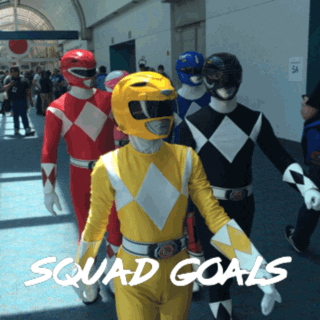It feels great to find people who share our interests and passions. And we’re currently in a time where we can find our people with those same interests more easily than ever before.
We yearn for authentic connections in modern life, and when it comes to building community on campus, we always need to think outside the box to find new, more effective ways to foster engagement.
Learning more about different communities, like Twitch, Nerdfighteria, and San Diego Comic-Con, got me thinking about how there is such a vibrant community of geeks and nerds out there who come together wherever they are to celebrate what they love, whether that’s anime, video games, comic books, television, or movies.

In the end, it doesn’t really matter what it is: We all geek out about something. Any organization or institution would love to see such a passionate and engaged audience engage with their events. An audience that buzzes about things coming up, is willing to wait in line, and has no problem paying for content? That’s invaluable.
Thankfully, nowadays, it is much more socially acceptable to be unabashedly excited about what we love. We just need to tap into that energy and bring people together to share in their enthusiasms.
Unfortunately, college students are often isolated and more willing to just stay in to nurture their hobbies then venture out to make connections IRL (in real life). They’re still finding themselves, figuring out their personalities and values, and maybe moved away from home for college. At the very least, they’re in a new environment where they don’t know as many people.
Even if they’re not new to the institution, this negative feeling only compounds over time. The value of in-person connections, especially based upon shared passions, is enormous. It could even help deter someone from dropping out.
Embracing the enthusiasm of the geek realm, I think there are some simple steps to be take to get a campus community engaged — specifically those who might not otherwise come out to socialize. Taking cues from great “Geek Week” initiatives on campuses like Rutgers University (which I had the pleasure of helping with) and UCLA, here’s how to get started.
1. Give Them the Space
A big struggle for groups is finding good space to fit their needs. Maybe they need enough seats, the right tech setup, or a lot of table space. You can’t bring people together without somewhere for them to hang out.
You can figure out what method works best for your campus, but what I’ve seen work well is simply planning thematic meetups where people can come to chat about what they love. Or, just general game nights where people can bring board games and video games to play together.
Offering the resources you have to students who need it and supporting their involvement is a great first step, since once you get people together to have fun, the students will move to take it from there. Sometimes, all they need is some initial scaffolding to get started.
2. Let Them Lead
Once the students have a good thing going, the word will get out and efforts will need to expand and formalize.
Students are always going to know better than us what their peers want. So we need to respect and listen to their voices. Allow them to take it on from there with your guidance, and they’ll have an awesome learning opportunity taking ownership over their work. It also will feel more genuine and accessible for other students to get involved.
What’s great about this is that the students’ ability to come up with great ideas eclipses what I could ever do. They knew about different games, people to reach out to, and creative ways to get around problems.
It was was a lot of fun to watch it happen, and only added to the learning that the students were getting. Again, these were the students who most had written off because they never came out to anything, but they were becoming highly engaged in this self-led programming.
3. Encourage Heart (and Embrace the “Cheese”)
We have so much knowledge in our heads about the things that we love, we’re ready to burst with enthusiasm. Combine this with students being their anxious, awkward selves at times, and things can get a little weird at times.
But sometimes, weird is good, and we need to cultivate a sense of belonging and safety for everyone to let their geek flag fly. And even though the stuff we’re into can be a little goofy and dorky, and maybe doesn’t make a whole lot of sense to everyone at times, we should just embrace it. It’s more fun that way.
Having some empathy and patience here goes a long way. Being open and honest about our interests, while awesome, also makes us vulnerable. Fear of judgment — especially if someone has been previously bullied — can be an incredibly strong force. If someone thinks our interests are stupid or our opinions are invalid, then we’ll withdraw.
We need to make sure everyone feels safe and respected to be themselves. We shouldn’t disparage people just because they have different opinions —there’s space for everyone to like what they like. It doesn’t hurt us for someone to like something that we don’t.
Events like Geek Week can be a lot of fun, and can diversify your program calendar, but they also serve an important purpose: Showcasing that it’s okay to be weird, to love whatever you want, and to be proud of it.
Hopefully you can foster something like this on your campus to help bring in those students who feel like they haven’t found their people yet. If you’ve found success with bringing in the previously uninvolved student, let us know on Twitter @HigherEd_Geek and @themoderncampus!





